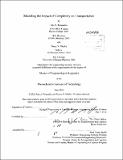Modeling the impact of complexity on transportation
Author(s)
Fernandez, Jose A. (Jose Antonio Fernandez Chavira); Okafor, Henry N
DownloadFull printable version (16.74Mb)
Other Contributors
Massachusetts Institute of Technology. Engineering Systems Division.
Advisor
Chris Caplice.
Terms of use
Metadata
Show full item recordAbstract
This thesis aimed to understand the drivers of total transportation costs during supply chain complexity events, in particular new product launches, in a fast moving consumer goods company in the United States. The research specifically investigated which of the four key transportation cost drivers (line haul rates, length of haul, frequency of loads and regional factors) changed the most during a new product launch. The analysis showed that the main driver of transportation costs during a new product launch (for our case study) is the length of haul. This finding was used to further investigate how the allocation of transportation to factories within the distribution network affects the length of haul (and therefore total transportation costs) during a new product launch. The analysis also reveals that effective enforcement of line haul rates alone (with transport carriers) do not guarantee low transportation costs during new product launches. The total system transportation cost in 2011 was compared with the lowest cost mix of factories by transportation allocation. This cost comparison was done on the basis of the cost-to-serve each wholesaler in the distribution network. A model was then developed which can be used to predict the changes in transportation costs during supply chain complexity events, including specific variability. This research also revealed that total transportation costs (in the distribution network) increase significantly during complexity events and that the highest variability occurred in the high season for each launch location.
Description
Thesis (M. Eng. in Logistics)--Massachusetts Institute of Technology, Engineering Systems Division, 2012. Cataloged from PDF version of thesis. Includes bibliographical references (p. 74-75).
Date issued
2012Department
Massachusetts Institute of Technology. Engineering Systems DivisionPublisher
Massachusetts Institute of Technology
Keywords
Engineering Systems Division.